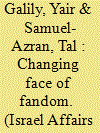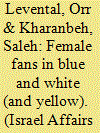|
|
|
Sort Order |
|
|
|
Items / Page
|
|
|
|
|
|
|
| Srl | Item |
| 1 |
ID:
172149


|
|
|
|
|
| Summary/Abstract |
The article seeks to document the changing patterns in football fandom over the past three decades, since the advent of the so-called era of globalisation, using the case study of Israel. It shows how, in line with global trends, Israeli fans moved from passive following of sport clubs identified with political parties to becoming active supporters with growing involvement in the clubs’ management. The article also traces the shift from party politics to patterns of nationalism and ethnocentrism amongst sport fans. Finally, it shows how Israelis moved from fandom of local clubs to that of foreign clubs, mirroring a similar trend in other countries.
|
|
|
|
|
|
|
|
|
|
|
|
|
|
|
|
| 2 |
ID:
187064


|
|
|
|
|
| Summary/Abstract |
This article examines female basketball fandom in Israel, concentrating on the relationship between gender and ethnonational identity in sport. It is based on two preliminary assumptions: (a) sport is considered a masculine sphere of interest; (b) sport in general, and fandom in particular, are part of the unique sociocultural life; hence patterns of Israeli female fandom are influenced by collective-Israeli ethnonational and gender identity. The article follows the qualitative-narrative approach, using in-depth interviews. Its findings revealed symbiotic relationships between fans’ ethnic-national identity and their fandom for Maccabi Tel Aviv and views of the team’s players.
|
|
|
|
|
|
|
|
|
|
|
|
|
|
|
|
| 3 |
ID:
176986


|
|
|
|
|
| Summary/Abstract |
Scholarship on race and gender in boxing have examined how meanings of masculinity are produced vis-à-vis a boxer’s identity. This study offers an ethnographic exploration of boxing spectator relations, especially how male fans of colour negotiate racialised masculinities outside of the ring. The subsequent analysis yields important insights into how race intersects with masculinity, class, sexuality, and nation. Drawing upon ethnographic research conducted during a Manny ‘Pac-Man’ Pacquiao vs. Juan Manuel Marquez boxing match, interviews, and critical discourse analysis (CDA), this article examines how performances of racialised masculinity permeate the fan space. In this space, African American, Latino, and Filipino American men negotiate meanings of masculinity that reproduce unequal power relations. Here, in the presence of other men of colour, differences among them are accentuated through the politics of gender relations that inevitably produce conflicts among marginalised communities and reveal competing versions of masculinity that inevitably rely upon heteronormative underpinnings.
|
|
|
|
|
|
|
|
|
|
|
|
|
|
|
|
| 4 |
ID:
098371


|
|
|
|
|
| Publication |
2010.
|
| Summary/Abstract |
In recent years, Japanese popular culture has received much attention both inside and outside the academy. Its success overseas has contributed to theories of transnational cultural flow, 'soft power' and 'Gross National Cool'. At the same time, public opinion of fans, both in Japan and overseas, remains low. This article attempts to rescue fandom from its current association with social ostracism, placing it instead in a logical structure of a historical consumer culture in Japan and in the West. Fandom can be considered a rational consumer strategy, rather than a deviant psychological attribute, when considered within the hyper-developed context of a media-saturated, late-capitalist consumer society. Fandom, when viewed from this perspective, can be distinguished from pathological behaviour and focuses on pleasure, the pursuit of social capital, and individualised identity building, especially in a society where traditional corporate groups such as the family or the workplace no longer offer the same attraction.
|
|
|
|
|
|
|
|
|
|
|
|
|
|
|
|
|
|
|
|
|